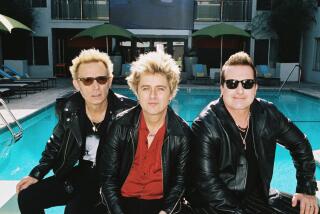Accusations Against Armstrong All to Familiar
- Share via
WASHINGTON — This certainly isn’t the first time Lance Armstrong has been accused of cheating. He’s been accused by journalists and by competitors. He’s had his urine samples from Tour de France competitions investigated by a suspicious French government. A former personal assistant dragged his name through the mud by saying she disposed of his used syringes. Armstrong has been accused so many times of using performance-enhancing substances there’s a boy-crying-wolf quality to it all because every drug test he has taken has come back negative.
But performance enhancement, whether we’re talking about steroids or blood doping, is the boogeyman of sports now, so it’s impossible to turn a deaf ear to these accusations, the latest of which hit the news Tuesday. L’Equipe, the French newspaper, has a four-page spread entitled “The Armstrong Lie” that reports that a recent testing of a 1999 B sample of Armstrong’s urine revealed evidence of the drug EPO. EPO is said to be a choice drug for events requiring great stamina, because it artificially increases the number of red blood cells.
L’Equipe says EPO showed up in Armstrong’s urine six times during the 1999 Tour de France, the first of Armstrong’s historic and, to many, inspirational seven victories there.
Is this accusation any more solid than the previous ones? We still don’t know. L’Equipe based its investigation on what are called B samples, which are the second of two samples used in doping tests. The A samples were used for tests six years ago, and the B samples had an ID number the newspaper says it matched to Armstrong, and printed photos of what it says are the official doping documents.
So, we’re supposed to hang Armstrong on six-year-old B samples? How can we be sure they were his or that they hadn’t been contaminated in all that time?
Well, there’s more. The Tour de France’s director, Jean-Marie Leblanc, said in a radio interview that he found L’Equipe’s report to be “very complete, very professional, very meticulous” and that it “appears credible.” So, this wasn’t some goofball taking potshots at Armstrong anonymously. It’s the director of the race saying, essentially, he believes Armstrong cheated to win the 1999 Tour de France.
And what did Armstrong have to say? He said what he always does, writing on his Web site, “Unfortunately, the witch hunt continues and tomorrow’s article is nothing short of tabloid journalism.
“I will simply restate what I have said many times: I have never taken performance-enhancing drugs.”
So, here we are again, at the point where we’re expected to choose who we believe. We did this with Jose Canseco when he wrote his juice-and-tell book. We did this with Rafael Palmeiro when he told Congress, while pointing for dramatic emphasis, that he never took steroids -- only to test positive for steroids weeks later.
Clearly, the great majority of Americans want to believe Armstrong. But a whole lot of people believed Palmeiro, too.
I choose to believe Armstrong because he seems to embody all the characteristics I find appealing in a competitor, from his doggedness in fighting off cancer to his dedication to training to the way he dominates the most difficult parts of the event that has defined his athletic career: the Tour. I don’t know much about cycling but I know Armstrong has demonstrated great consistency over many years, that he’s never had the kind of spike in performance that leads us to think about Flo Jo or swimmer Michelle Smith.
My friend Charles Barkley always says we cut people a break if we like them, plain and simple. And not only do most of us like Armstrong, we find his story irresistible. Cancer killed my father -- so I’m predisposed to root for Armstrong, who, by the way, has said his doctors prescribed EPO to help him fight through chemotherapy, though that happened before 1999.
Armstrong has faced up to, and defeated, every reasonable drug allegation, which is quite impressive seeing as there is no shortage of people, particularly in France, who would go to any lengths to prove he is a doper and couldn’t possibly have won seven consecutive Tours without illegal help.
Having said all that, if it was ever proven that Armstrong did cheat by taking performance enhancers, I wouldn’t be shocked. Disappointed? Yes. Shocked? No.
Performance-enhancing drugs are so omnipresent it’s almost laughable. A Russian runner, Anastasiya Kapachinskaya, had to give back her 2004 world indoor 200-meter gold medal upon failing a drug test. Meantime, she was handed the gold medal from the previous year’s 200-meter event because the woman who beat her that time, American Kelli White, had her victory taken away because she tested positive for drugs. As bad as track and field is, it’s no worse than cycling, which operates under a permanent black cloud.
I don’t know whether to believe L’Equipe, which seems to be at the center of every allegation. It was a former L’Equipe writer, Pierre Ballester, who co-authored a book published last year that included allegations against Armstrong, who took libel action against the Sunday Times after the English newspaper reprinted some of them.
That case is scheduled to go to trial in London’s High Court in November. But that’s not going to stop the speculation, or the feeling (particularly in Europe) that Armstrong is a cheater. The French Sports Minister, Jean-Francois Lamour, is quoted as saying, “It’s a shock to learn this about a great champion....This is certainly an element that could tarnish his image.”
There’s so much at stake here, like a hero’s reputation worldwide.
Armstrong is so much more important to the world than Rafael Palmeiro, or Jason Giambi, or for that matter, Barry Bonds. People who have never even seen him perform on television have invested so much hope in his battles and his achievements. Usually, these allegations are easily dismissed, like a tabloid story purporting an actress giving birth to an alien baby. But you have to wonder, given the times, if this latest report is going to shake folks’ considerable faith in Armstrong, if only just a little.
More to Read
Go beyond the scoreboard
Get the latest on L.A.'s teams in the daily Sports Report newsletter.
You may occasionally receive promotional content from the Los Angeles Times.










